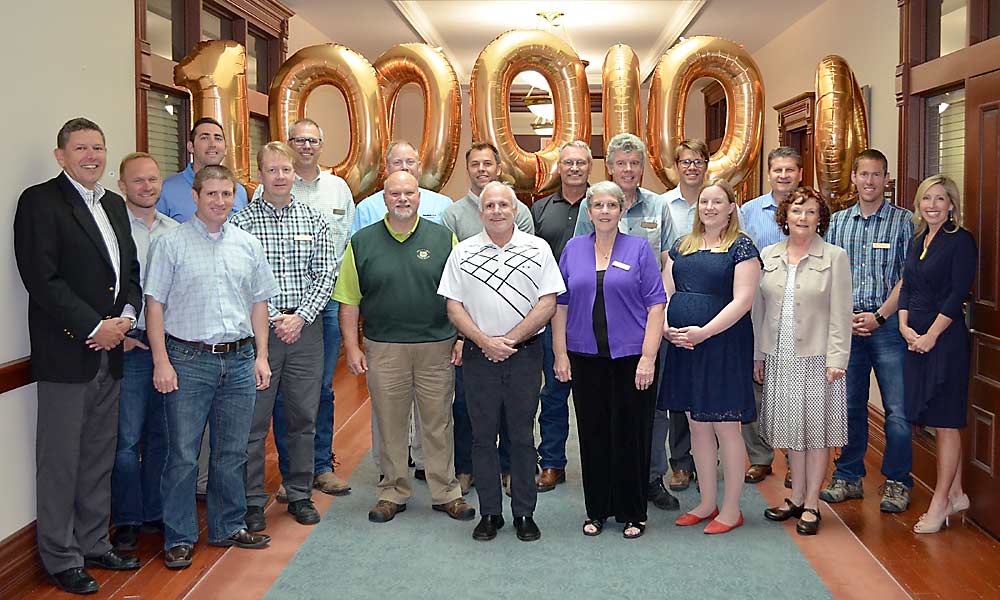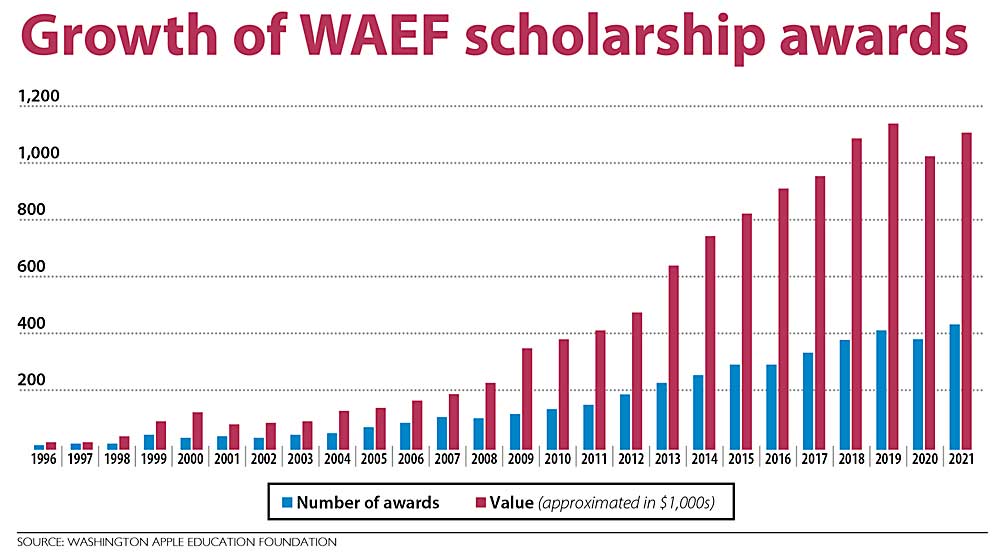
After nearly 21 years as the executive director of the Washington Apple Education Foundation (WAEF), I am passing the reins to new leadership at the foundation. As one of my last projects, I am excited to share a recap of the progress of the industry’s charity from its initial roots in the mid-1990s.
WAEF began as a project of the Washington Apple Commission when Tom Hale was the president. At the time, it was widely known that individual tree fruit industry companies were involved in aiding the community, but there wasn’t an entity in place to assist with coordination or to promote awareness of industry good works. An industry charity dedicated to serving the charitable interests of the industry was seen as the answer and, in 1994, WAEF was formed with the mission to promote, coordinate and develop educational opportunities on behalf of the apple industry. The mission was changed soon after from “apple industry” to “tree fruit industry.”
Two of the fundraising events recognized by many in the industry got their starts in WAEF’s early years. The Rear’s sprayer raffle was the first fundraiser occurring in 1995 and, today, raffle tickets still cost $25 each and a Rear family member still pulls the winning ticket at the tree fruit industry’s awards banquet in December. WAEF golf tournaments began in 1997. Wilbur-Ellis Co., Abbott Labs and Northwest Farm Credit Services signed on to be the major golf sponsors in the first year.
Following multiple conversations with industry members, several initial impact areas were identified for WAEF: Nutrition education was intended as the primary activity, followed by scholarships, farmworker education and industry education.
Healthy Choices for Kids was a nutrition education curriculum developed by the Washington Apple Commission. It was cutting-edge at the time and was one of the first in the nation created by a commodity association. With seed money provided by WAC and the Kraft Foundation, WAEF took over distribution of the curriculum and later transferred it to an online format.
Funding for scholarships and farmworker education grants also initially came from the Washington Apple Commission. Farmworker education grants were awarded to community organizations providing services to farmworker families — in the forms of scholarship funding, housing, purchase of translating equipment, books for young readers and more.
Nutrition education and farmworker education grant administration continued for many years until scholarships and wrap-around support for students from fruit-growing regions became the dominant focus.
Industry members “voting with their dollars” raised scholarships to a prominent level in the mid-2000s. WAEF hit the $100,000 scholarship milestone in 2004 and continued to climb upward annually, achieving a proud moment in 2016 when $1 million was awarded. Growth came from industry employers creating opportunities for children of workers, families and friends honoring the memories of industry leaders, and interested members creating awards to make college more accessible.

In 2004, the WAEF scholarship committee decided to reach out to high school students about how to avoid some of the common errors we were seeing on scholarship applications. The training program dramatically evolved over the years to become a comprehensive curriculum on completing award-winning scholarship applications. WAEF has received funding from other local and statewide scholarship organizations to support our delivery of scholarship training.
WAEF has seen the greatest growth in scholarship recipients by those who are the first in their families to attend college. Today, 75–80 percent of our scholarship recipients are first-generation students. WAEF learned early on that this group had unique needs, and more than financial support was necessary to boost their chances of success in college. In 2014, the board of directors allocated funds to what we now call Beyond the Scholarship student success outreach.
When I think back on WAEF’s history, this was a major turning point for the foundation. WAEF moved from measuring success solely by how many scholarships we awarded annually to instead measuring if students were realizing their college goals.
Once we began communicating this new direction, scholarship contributions grew even faster. Investing in student success resonated with industry members. At the time, the board was concerned that we may trade lower scholarship funding for more in-depth student outreach, but the opposite occurred: We grew both in size and scope.
In 2017, we pledged to students that we would follow them through their four undergraduate years if they did their part by staying enrolled full-time, progressing on a path to degree completion and achieving a minimum GPA. The board boldly made the pledge to renew all students meeting renewal criteria, even when we couldn’t clearly see the path for how we would actually pay for it. The industry has made this happen each and every year since.
Today, WAEF awards over $1 million in scholarships each year to students raised in industry families. We provide mentoring, professional development workshops, career exploration events, care packages, online outreach, resume reviews and many other support services to our scholarship recipients with the help of hundreds of volunteers annually.
This outreach makes a difference. WAEF students beat the odds for college success, with over 90 percent progressing each year and over 70 percent achieving graduation in four or fewer years. This compares with a national statistic of only 26 percent of first-generation, low-income students graduating from college in six or fewer years. Last spring, when our country was in the midst of the pandemic, over half of our graduates had career jobs secured prior to college graduation. WAEF graduates can be found working in all sectors of our communities in agriculture, business, medical, education and social services roles.
Our mission statement today reads: “The Washington Apple Education Foundation is the charity of Washington’s tree fruit industry. Our mission is to impact lives through access to educational opportunities.” This tells who we are and communicates what we do on behalf of the industry. And WAEF is the tree fruit industry’s charity in all ways, including in its desire to continually improve, innovate and be a model for others to follow.
The Washington Apple Education Foundation has been served by a long list of caring and committed board members who have each made WAEF stronger. For my part, I have thanked the members of the 2001 board many times for selecting me to be part of WAEF. I am forever grateful to the WAEF community of donors, students, staff and volunteers who have made my professional career so rich. In 2001, when I began this job, it simply seemed like a challenging career move; the “job” quickly became a passion filled with energizing and affirming interactions with generous industry members and highly deserving young people.
My best wishes to the new executive director of WAEF, Faviola Barbosa. I am sure she will appreciate the warmth of the industry and its commitment to making a difference, and she will proudly serve the tree fruit industry as the executive director of its charity.
—by Jennifer Witherbee
A history of service
The Washington Apple Education Foundation has grown in scope and reach since its inception in 1994, thanks to the enduring commitment of a long list of caring board members.
Roger Strand was WAEF’s first chairman, serving from inception to 1996, with the first elected directors: Frank Elsener, Bruce Grim, Buell Hawkins, Don Heinicke, Ross Larson, Ralph Longanecker, Don Richards, Peter Verbrugge, Jim Wade and Janet White.
WAEF continued to grow and evolve over the years, as new chairmen took the helm to encourage continued industry support. Here is a list of the WAEF chairpersons over the years:
Buell Hawkins (1996)
Janet White (1997)
Peter Verbrugge (1998)
Barbara Walkenhauer (1999)
Leo Sax (2000)
Christian Schlect (2001)
Peter Van Well (2002)
LaVerne Bergstrom (2003)
Hans van Someren Gréve (2004)
John “Jack” Toevs (2005)
Ken Smith (2006)
Roger Calhoun (2007)
Tom Stokes (2008)
Ruth Pringle (2009)
Steve Clive (2010)
Berti Stewart (2011)
Brian Alegria (2012)
Miles Kohl (2013)
Jeff Fagg (2014)
Rachel Sullivan (2015)
Kailan Dunn (2016)
James Foreman (2017)
Bob Mast (2018)
Chris Willett (2019)
Laurie Knebusch (current)
Vicky Scharlau was contracted as the foundation’s first executive director. Sherrye Wyatt was also instrumental in the forming years and followed Vicky as executive director of WAEF. She served in the position until 2001, when I took over the job. With my retirement this year, Faviola Barbosa has joined WAEF as its new executive director.
—Jennifer Witherbee






Leave A Comment